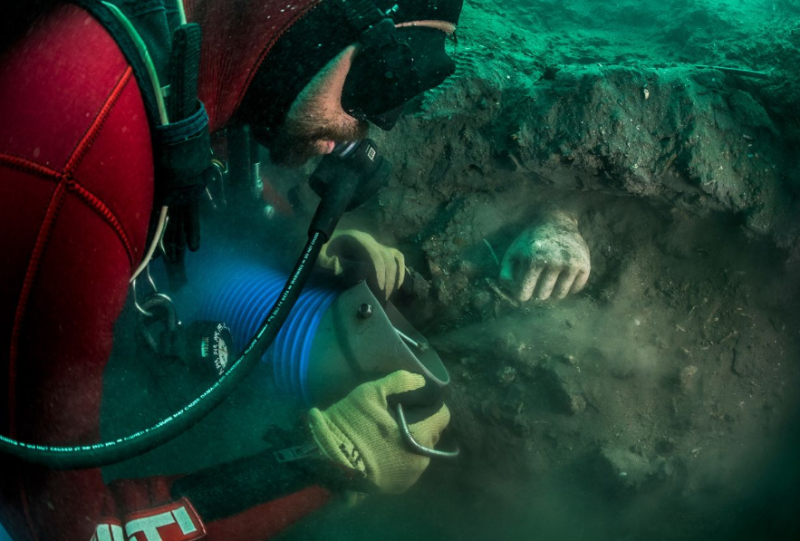East of the temple of Ammon, a Greek sanctuary dedicated to Aphrodite was discovered containing bronze and ceramic objects
The sunken temple of the god Ammon off the Mediterranean in Egypt hid “treasures and secrets, announced the European Institute of Underwater Archeology (IEASM) in a press release on Tuesday.
The discoveries were made by an underwater archaeological team, led by French marine archaeologist Franck Gaudiot, at the site of the temple of the god ‘Ammon in the ancient port city of Thonis-Heraklion in the Gulf of Aboukir, the institute said.
The team investigated the city’s southern canal, where huge boulders from the ancient temple collapsed “during a cataclysmic event dating to the mid-second century BC,” the institute said.
It was to the temple of the god Ammon that the pharaohs came “to receive their titles of authority as world kings from the supreme god of the ancient Egyptian pantheon.”
According to the same announcement, from the Institute, “precious objects belonging to the treasury of the temple have been discovered, such as silver ritual instruments, gold jewelry and fragile alabaster containers for perfumes or ointments. The objects bear witness to the wealth of this sanctuary and the piety of the former inhabitants of the port city.’
The archaeological excavations, jointly conducted by Godio’s team and the Marine Archeology Department of the Egyptian Ministry of Tourism and Antiquities, revealed underground structures “supported by very well-preserved wooden posts and beams dating from the 5th century BC,” the institute said.
“It is extremely moving to discover such delicate objects, which survived intact despite the violence and magnitude of the flood,” said Godio, who is president of IEASM and director of excavations.
The discoveries were made possible by the development and use of new geophysical prospecting technologies that can detect cavities and objects “buried under layers of clay several meters thick,” the institute said.
Remains of the Greek presence
East of the temple of Ammon, a Greek sanctuary dedicated to Aphrodite was discovered that contained bronze and ceramic objects.
“This shows that the Greeks who traded and lived in the city during the time of the pharaohs of the Saite dynasty (664 – 525 BC) had their sanctuaries dedicated to their own gods,” the institute said.
The discoveries of Greek weapons also reveal the presence of Greek mercenaries in the region, the IEASM statement said, who were defending access to the Kingdom at the mouth of the Canopic Branch of the Nile. This branch was the largest and best navigable in ancient times.
The ruins of Thonis-Heraklion lie under the sea, 7 kilometers (4.3 mi) off the present-day coast of Egypt. The city was for centuries Egypt’s largest port in the Mediterranean before the founding of Alexandria by Alexander the Great in 331 BC.
The city was discovered in 2000 by the European Institute of Underwater Archeology (IEASM).
Photo credit: Franck Goddio/Hilti Foundation
Source :Skai
I am Frederick Tuttle, who works in 247 News Agency as an author and mostly cover entertainment news. I have worked in this industry for 10 years and have gained a lot of experience. I am a very hard worker and always strive to get the best out of my work. I am also very passionate about my work and always try to keep up with the latest news and trends.











